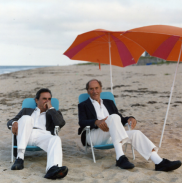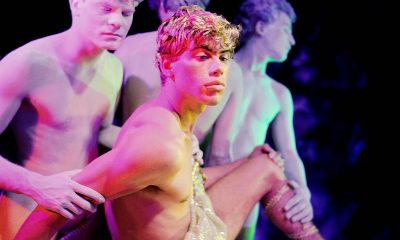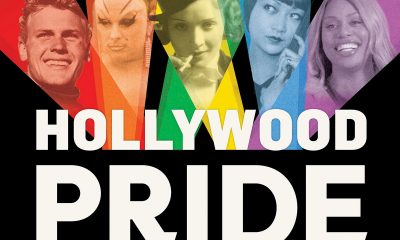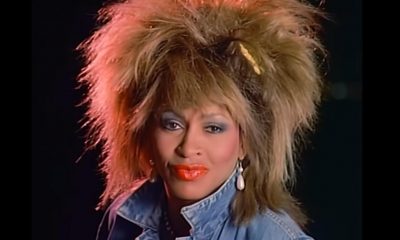Arts & Entertainment
From Broadway to Hollywood
‘Double Life’ memoir recounts 50-year love story of artist and TV mogul
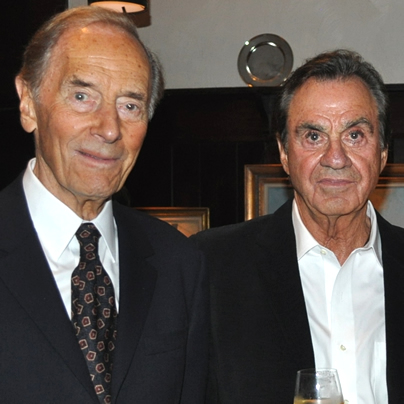
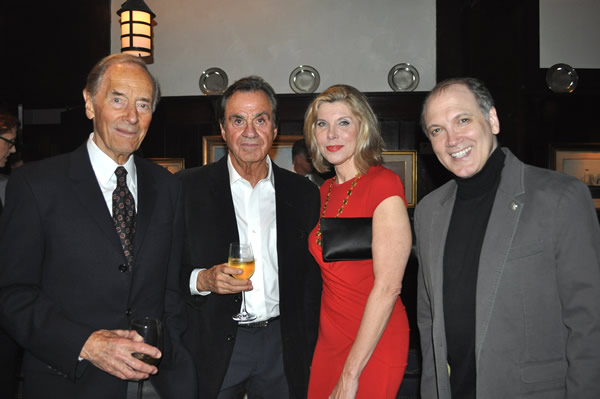
From left, Alan Shayne and Norman Sunshine with Christine Baranski and Charles Busch at a launch party for their book in November. They’ll be in Washington this week for a similar event. (Photo courtesy Scott Manning & Associates)
Careers in the arts are never easy, but for every Sinatra, Hepburn or Garland there are hundreds, perhaps thousands, of actors, singers and behind-the-scenes moguls and designers who manage long, successful careers in New York or Hollywood without becoming household names.
Alan Shayne and Norman Sunshine are two such figures. Shayne is a former actor-turned-casting agent-turned TV mogul who nurtured hit ‘70s shows like “Dukes of Hazzard” and “Alice” to the airwaves during his 10 years as president of Warner Brothers Television. Sunshine, his partner of 50 years, is a painter and sculptor who made ads for Blackglama Minks (“What becomes a legend most?”) and Danskins (“Danskins are not just for dancing”) famous between stints of having his own exhibitions and commercial projects. After decades of navigating the thick jungles and uphill battles of the art world and entertainment industry, one wonders their thoughts on the ways of those worlds: with tenacity, does the cream inevitably rise or have we missed geniuses along the way?
They say it’s gotten tougher to “make it” over time.
“I think the thing I’ve observed in the fine arts is the phenomenon of money coming into play more and more in which careers are measured by the amount of money that can be made off of it,” Sunshine says. “All these art fairs are really about money, the dealers and collectors being able to make money off of it. It’s different. I don’t know how one quite survives that … there’s a horrendous fickleness now on a scale we’ve not seen before.”
Shayne, who gave up acting because casting seemed more stable and practical, agrees.
“It’s a really tough road to hoe,” he says. “In my day, I could go to New York and live and rent a room for $5 a week and make it work. Now you can’t possibly do that. I don’t know how the young actors and young artists do it today. Yes, the Meryl Streeps and the Dustin Hoffmans and the Robert De Niros are going to succeed but I worry about some of the little people who are also very talented.”
In November, the two had their joint autobiography published by Magnus Books — “Double Life: a Love Story from Broadway to Hollywood.” They’ll be in Washington Monday for a private reception for the book.
And even though the book is drawing raves — Joan Rivers called it “beautifully written” and “filled with humor” and legendary critic Rex Reed called it a “riveting” book by “two extraordinary men” — Shayne and Sunshine, who worked on it for about three years, say getting it published was not easy.
“We got the most glowing rejection letters you could imagine from the leading publishing houses,” Shayne says.
He says it was worth the effort to get the book in print to show that long-term gay relationships are possible.
“We’d been terribly disturbed by the suicides,” Shayne says. “Time magazine did a story where they talked to young gays in their 20s who didn’t believe any [gay] relationship could last past 10 years. People have told us we’re a rather inspirational couple so we decided to tell our story.”
“There had always been this thinking that, ‘Oh God, it’s a terrible life,’” Sunshine says. “We wanted to kind of deal with that issue and let people know we’re not always in feathers or this and that. We’re like you. We have the same loves, desires and careers. We felt we had a responsibility to tell that story.”
And it is quite a story. With fun anecdotes of the famous paths with whom they’ve crossed — Lena Horne, Laurence Olivier, Marlon Brando, David Susskind, Helen Hayes, George Cukor, Katharine Hepburn, Norman Lear, Bette Davis, Rock Hudson and more make memorable appearances — the book is delightfully shameless in its name dropping.
Just as vivid, though, are lengthy passages where the two write evocatively of what it was like to be gay in the ‘50s and ‘60s, to what degree they were able to be out (if at all) and how their relationship evolved over the decades. Shorn of any Jackson-Paris-type false idealism — they make it clear it wasn’t always a bed of roses — their experiences come vividly to life.
“We felt we had to be totally honest for the book to work,” Shayne says. “We found out things about each other we didn’t know but we felt if we weren’t totally honest about it, what would be the point? Otherwise it would be so goody-goody you couldn’t stand it. But we got through it and that’s really the story of our relationship. We ended up supporting each other.”
“A lot of people have identified very strongly with the book,” Sunshine says. “It gives them insight into the time period and the history of the gay situation vis-à-vis us.”
During a lengthy phone chat from their home in Palm Beach, Fla., the two — on a joint call — happily elaborate on topics touched on in the book.
Though they still drink, it’s mostly just wine these days —they’ve traded in the Rob Roys they drank copiously for years for California chardonnay.
They attribute their long careers to their mutual abilities to adapt. Some opportunities came out of nowhere — like the Tiffany display that helped launch Sunshine’s impressive art career — while others were built piece by piece through painstaking work like the cards Shayne kept on each actor he saw so he’d have a bounty of suggestions to directors casting various projects.
Their various country houses — in Pennsylvania, Connecticut and more — have helped them grow together, they say.
“In the ‘50s, when you couldn’t really be openly gay, our homes became terribly important to us and we were happiest when we were there by ourselves,” Shayne says.
He also says the popular notion that CBS didn’t care about “Alice” spin-off “Flo,” an eponymous sitcom for Polly Holliday’s sassy character, isn’t true. It was not a victim, he says, of the network carelessly changing the show’s time slot repeatedly in those pre-VCR or TiVo days. Shayne says he worked hard to make “Flo” fly just as he’d done with “Alice” in its rocky first season but ultimately the audience wasn’t buying the character in a world outside Mel’s Diner.
But how did “Alice” succeed another five seasons without its most popular character while “Flo” failed?
“I love Polly and at the time, it seemed like a good idea to bring Diane (Ladd — who’d played Flo in the film) back (to ‘Alice’),” Shayne says. “We really had hoped ‘Flo’ would be a big success and believe me, we did everything. We changed writers, changed producers, nothing seemed to work, but God knows we tried. … the public kind of wanted her there saying, ‘Kiss my grits’ in the diner and she became really a different character when she had her own show. She wanted to be different … CBS was actually very cooperative.”
Ironically perhaps, Shayne and Sunshine say though they socialized several times with Cukor, the legendary “old Hollywood” director who was gay and famous for his parties, they never discussed their relationship or homosexuality with him.
“He knew we were a couple, he would invite us both to dinner, but it was always a mixed group. Sometimes Kate (Hepburn, who lived in Cukor’s guest house when she was on the West Coast) would stop by and say hello, but it was all very proper … I don’t think he ever mentioned the word gay to us,” Shayne says.
As for the changing times, they say it’s only in the last eight or 10 years that they’ve felt comfortable being fully out in all aspects of their lives. They wed in Massachusetts eight years ago initially for practical reasons. They were pleasantly shocked at how welcomed they were by the hotel staff where they stayed.
“AIDS really exploded the conversation on gay issues,” Sunshine says. “It was the instrument by which the whole gay thing came out as a national discussion.”
And what about the irony of Sunshine being the Emmy winner in the family despite Shayne’s long career in television (Sunshine won for titles he designed for a special in the mid-‘70s)?
“Can you hear me gnashing my teeth,” Shayne says.
Books
Love or fear flying you’ll devour ‘Why Fly’
New book chronicles a lifetime obsession with aircraft

‘Why Fly’
By Caroline Paul
c. 2026, Bloomsbury
$27.99/256 pages
Tray table folded up.
Check. Your seat is in the upright position, the airflow above your head is just the way you like it, and you’re ready to go. The flight crew is making final preparations. The lights are off and the plane is backing up. All you need now is “Why Fly” by Caroline Paul, and buckle up.

When she was very young, Paul was “obsessed” with tales of adventure, devouring accounts written by men of their derring-do. The only female adventure-seeker she knew about then was Amelia Earhart; later, she learned of other adventuresome women, including aviatrix Bessie Coleman, and Paul was transfixed.
Time passed; Paul grew up to create a life of adventure all her own.
Then, the year her marriage started to fracture, she switched her obsession from general exploits to flight.
Specifically, Paul loves experimental aircraft, some of which, like her “trike,” can be made from a kit at home. Others, like Woodstock, her beloved yellow gyrocopter, are major purchases that operate under different FAA rules. All flying has rules, she says, even if it seems like it should be as freewheeling as the birds it mimics.
She loves the pre-flight checklist, which is pure anticipation as well as a series of safety measures; if only a relationship had the same ritual. Paul loves her hangar, as a place of comfort and for flight in all senses of the word. She enjoys thinking about historic tales of flying, going back before the Wright Brothers, and including a man who went aloft on a lawn chair via helium-filled weather balloons.
The mere idea that she can fly any time is like a gift to Paul.
She knows a lot of people are terrified of flying, but it’s near totally safe: generally, there’s a one in almost 14 million chance of perishing in a commercial airline disaster – although, to Paul’s embarrassment and her dismay, it’s possible that both the smallest planes and the grandest loves might crash.
If you’re a fan of flying, you know what to do here. If you fear it, pry your fingernails off the armrests, take a deep breath, and head to the shelves. “Why Fly” might help you change your mind.
It’s not just that author Caroline Paul enjoys being airborne, and she tells you. It’s not that she’s honest in her explanations of being in love and being aloft. It’s the meditative aura you’ll get as you’re reading this book that makes it so appealing, despite the sometimes technical information that may flummox you between the Zen-ness. It’s not overwhelming; it mixes well with the history Paul includes, biographies, the science, heartbreak, and exciting tales of adventure and risk, but it’s there. Readers and romantics who love the outdoors, can’t resist a good mountain, and crave activity won’t mind it, though, not at all.
If you own a plane – or want to – you’ll want this book, too. It’s a great waiting-at-the-airport tale, or a tuck-in-your-suitcase-for-later read. Find “Why Fly” and you’ll see that it’s an upright kind of book.
The Blade may receive commissions from qualifying purchases made via this post.
Theater
Out actor Kevin Cahoon on starring role in ‘Chez Joey’
Arena production adapted from Broadway classic ‘Pal Joey’

‘Chez Joey’
Through March 15
Arena Stage
1101 Sixth St., S.W.
Tickets start at $93
Arenastage.org
As Melvin Snyder in the new musical “Chez Joey,” out actor Kevin Cahoon plays a showbiz society columnist who goes by the name Mrs. Knickerbocker. He functions as a sort of liaison between café society and Chicago’s Black jazz scene circa 1940s. It’s a fun part replete with varied insights, music, and dance.
“Chez Joey” is adapted from the Broadway classic “Pal Joey” by Richard Rodgers and Lorenz Hart. It’s inspired by John O’Hara’s stories based on the exploits of a small-time nightclub singer published in The New Yorker.
A warm and humorous man, Cahoon loves his work. At just six, he began his career as a rodeo clown in Houston. He won the Star Search teen division at 13 singing songs like “Some People” from “Gypsy.” He studied theater at New York University and soon after graduating set to work playing sidekicks and comedic roles.
Over the years, Cahoon has played numerous queer parts in stage productions including “Hedwig and the Angry Inch,” “La Cage aux Folles,” “Rocky Horror” as well as Peanut in “Shucked,” and George the keyboardist in “The Wedding Singer,” “a sort of unicorn of its time,” says Cahoon.
Co-directed by Tony Goldwyn and the great Savion Glover, “Chez Joey” is a terrific and fun show filled with loads of talent. Its relevant new book is by Richard Lagravenese.
On a recent Monday off from work, Cahoon shared some thoughts on past and current happenings.
WASHINGTON BLADE: Is there a through line from Kevin, the six-year-old rodeo clown, to who we see now at Arena Stage?
KEVIN CAHOON: Anytime I want to land a joke in a theater piece it goes back to that rodeo clown. It doesn’t matter if it’s Arena’s intimate Kreeger Theatre or the big rodeo at the huge Houston Astrodome.
I was in the middle stadium and there was an announcer — a scene partner really. And we were doing a back and forth in hopes of getting laughs. At that young age I was trying to understand what it takes to get laughs. It’s all about timing. Every line.
BLADE: Originally, your part in “Chez Joey” Melvin was Melba who sings “Zip,” a clever woman reporter’s song. It was sort of a star feature, where they could just pop in a star in the run of “Pal Joey.”
CAHOON: That’s right. And in former versions it was played by Martha Plimpton and before her Elaine Stritch. For “Chez Joey,” we switched gender and storyline.
We attempted to do “Zip” up until two days before we had an audience at Arena. Unexpectedly they cut “Zip” and replaced it with a fun number called “I Like to Recognize the Tune,” a song more connected to the story.
BLADE: Wow. You must be a quick study.
CAHOON: Well, we’re working with a great band.
BLADE: You’ve played a lot of queer parts. Any thoughts on queer representation?
CAHOON: Oh yes, definitely. And I’ve been very lucky that I’ve had the chance to portray these characters and introduce them to the rest of the world. I feel honored.
After originating Edna, the hyena on Broadway in “The Lion King,” I left that to do “Hedwig and the Angry Inch” as standby for John Cameron Mitchell, doing one show a week for him.
Everyone thought I was crazy to leave the biggest musical of our time with a personal contract and getting paid more money that I’d ever made to get $400 a week at the downtown Jane Street Theatre in a dicey neighborhood.
At the time, I really felt like I was with cool kids. I guess I was. And I never regretted it.
BLADE: When you play new parts, do you create new backstories for the role?
CAHOON: Every single time! For Melvin, I suggested a line about chorus boys on Lakeshore Drive.
BLADE: What’s up next for Kevin Cahoon?
CAHOON: I’m about to do the New York Theatre Workshop Gala; I’ve been doing it for nine years in a row. It’s a huge job. I’ll also be producing the “Cats: The Jellicle Ball” opening on Broadway this spring; it’s a queer-centric uptown vogue ball with gay actor André de Shields reprising his role as “Old Deuteronomy.”
BLADE: There’s a huge amount of talent onstage in “Chez Joey.”
CAHOON: There is. I’m sharing a dressing room with Myles Frost who plays Joey. He won accolades for playing Michael Jackson on Broadway. We’ve become great friends. He’s a miracle to watch on stage. And Awa [Sal Secka], a D.C. local, is great. Every night the audience falls head over heels for her. When this show goes to New York, Awa will, no doubt, be a giant star.
BLADE: Do you think “Chez Joey” might be Broadway bound?
CAHOON: I have a good feeling it is. I’ve done shows out of town that have high hopes and pedigree, but don’t necessarily make it. “Chez Joey” is a small production, it’s funny, and audiences seem to love it.

The Capital Pride Alliance held the annual Pride Reveal event at The Schuyler at The Hamilton Hotel on Thursday, Feb. 26. The theme for this year’s Capital Pride was announced: “Exist. Resist. Have the audacity!”
(Washington Blade photos by Michael Key)























-

 India5 days ago
India5 days agoActivists push for better counting of transgender Indians in 2026 Census
-

 Advice5 days ago
Advice5 days agoDry January has isolated me from my friends
-

 National4 days ago
National4 days agoAfter layoffs at Advocate, parent company acquires ‘Them’ from Conde Nast
-

 District of Columbia5 days ago
District of Columbia5 days agoCapital Pride reveals 2026 theme


